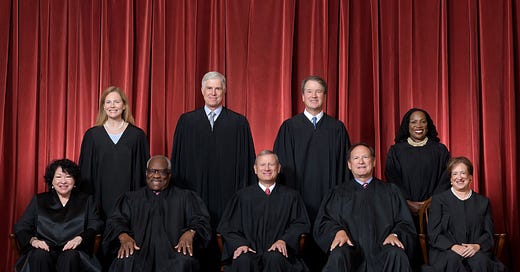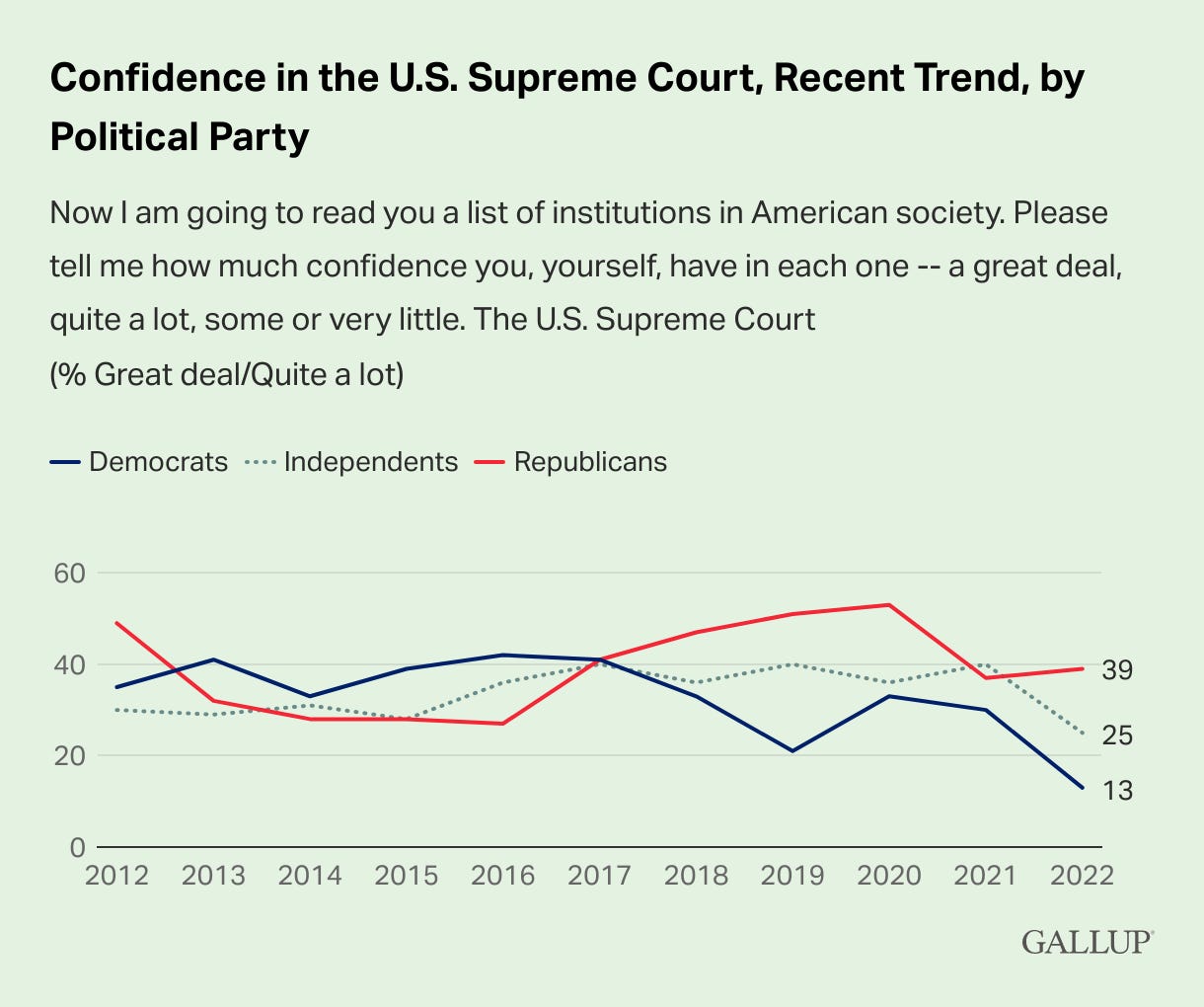Welcome back to The Burnett Breakdown where I, Hunter Burnett, keep up with the news so that you don’t have to. If you like this newsletter, then please like, subscribe, share, and comment. Also, don’t forget to check out The Burnett Breakdown podcast on all your podcast providers and YouTube.
The Role of the Supreme Court
In June every year, the Supreme Court releases opinions with many of them being of particular political pertinence. This means that I eagerly consume as much Supreme Court content and read as many of the opinions as I can, and I love every second of it. That joy comes with it a little bit of insanity though, as most of the headlines and commentary surrounding the Supreme Court are beyond preposterous.
In fact, I’m not sure there is a single topic more misunderstand by both the broader public and journalists in general. The more politicized the topic, the more nonsensical most of the headlines and articles will be. Part of the reason for this is simply the liberal bent that so many journalists have. They hold a particular set of values and when a Supreme Court ruling seems to affirm their values, then it’s a great moment in American history. On the other hand, when the Court refuses to affirm their values, it’s an attack on all that is good and right in the world.
It’s also the result of a total ignorance regarding what the Supreme Court’s actual role in our constitutional structure is. Alexander Hamilton wrote in Federalist 78, “The interpretation of the laws is the proper and peculiar province of the courts. A constitution is, in fact, and must be regarded by the judges, as a fundamental law. It therefore belongs to them to ascertain its meaning, as well as the meaning of any particular act proceeding from the legislative body.”
In other words, the judicial branch exists to interpret the words of the Constitution and all proceeding laws. It does this when specific cases arise that force the judicial branch to interpret specific parts of the Constitution or specific laws that have been passed. The Supreme Court does not take up specific political issues and then rule on the morality or value of a policy writ large.
Taking a case from this week as an example: the Supreme Court was not faced with the question of whether forgiving $10,000 of student loan debt for each individual was a good idea or a morally good policy. The Supreme Court was faced with the question of whether the Secretary of Education has the authority to forgive student loan debt based on the Higher Education Relief Opportunities for Students (HEROES) Act of 2003.
Similarly, the Supreme Court was not faced with the question of whether affirmative action was a good idea or morally good policy. The Supreme Court was faced with the question of whether the race-conscious admission policies of Harvard and UNC violated the equal protection clause of the 14th Amendment by discriminating against Asian-Americans.
The Difference
Understanding the Supreme Court’s proper role makes a world of difference in how one views the Supreme Court itself. The tendency for most journalists who think the Supreme Court is ruling on the moral goodness of specific policies is to view the justices who disagree with them as morally abhorrent. Clarence Thomas is against affirmative action because he immorally doesn’t want to help other black people.
When one views the Supreme Court properly, disagreements become about interpretation not morality. For example, Elana Kagan believed Biden’s student loan forgiveness policy was constitutional because she interprets the HEROES Act of 2003 more broadly than I do; not because she is an immoral person that wants those without a college degree to subsidize those who took out student loans.
This is of particular importance now as confidence in the Supreme Court continues to slide to all time lows according to Gallup. This decline has primarily been led by Democrats and Independents as the chart below shows.
This shouldn’t come as a surprise, as progressives dominated the Supreme Court for 50 years and are now faced with a significantly more conservative Supreme Court. However, it would do wonders for confidence in the institution if journalists did a better job of understanding its proper role instead of painting conservative justices as agents of evil.
Another trap that too many journalist fall into when reporting on the Supreme Court is citing public opinion polls about whatever topic a Supreme Court case impacts. For example, here is an excerpt from CNN reporting on the overturning of Roe v. Wade last summer:
A broad majority of Americans did not want to see Roe vs. Wade overturned, polling taken before the Supreme Court’s decision shows.
In a May CNN poll conducted immediately after the leak of the draft opinion, Americans said, 66% to 34%, that they did not want the Supreme Court to completely overturn its decision. In CNN’s polling dating back to 1989, the share of the public in favor of completely overturning Roe has never risen above 36%.
My point isn’t to dispute the facts laid out here by CNN. The majority of people probably were against the Supreme Court completely overturning Roe. But, who cares? It is not the job of the nine justices on the Supreme Court to know exactly what the majority of Americans think should happen in a given case- nor can they realistically be able to do that. It is their job to interpret what the constitution or a given law says regardless of what the public writ large may want.
It is the job of one branch of government to listen to the will of the people and consider doing what “the people” want, but that branch is called Congress. Failure to do what “the people” want could mean losing one’s job the next time they are up for reelection. The very reason that the Supreme Court justices do not have to face reelection is so that they don’t feel pressured to do whatever “the people” want them to do but to actually interpret the law correctly.
Have They Gone Too Far?
Now, let’s look at the two cases that have made so many journalists lose their minds this week: affirmative action and Biden’s student loan forgiveness.
In Students for Fair Admissions Inc. v. President & Fellows of Harvard College, the Supreme Court was asked, as I mentioned earlier, whether the race-conscious admission policies of Harvard and UNC violated the equal protection clause of the 14th Amendment by discriminating against Asian-Americans.
The 14th Amendment eliminated discrimination on the basis of the race. Meanwhile, Harvard and UNC took a candidate’s race into account when considering admittance, which led to fewer Asian-Americans getting in than otherwise would have. This is pretty straightforward racial discrimination and the Supreme Court deemed it unconstitutional as a result.
In Biden v. Nebraska, the Supreme Court had to determine whether the HEROES Act of 2003 gave the Secretary of Education the power to forgive $10,000 worth of student loans from everyone making less than $125,000. The relevant part of the HEROES Act reads:
“Authorizes the Secretary of Education to waive or modify any requirement or regulation applicable to the student financial assistance programs under title IV of the Higher Education Act of 1965 as deemed necessary with respect to an affected individual who (4) suffered direct economic hardship as a direct result of a war or other military operation or national emergency.
The majority ruled that this Act did not grant the Secretary broad and far-reaching powers to forgive student loans for ALL individuals in response to a “national emergency” that the President’s administration would say was over just a couple weeks later. If Congress intended to give this kind of power, then it needed to be more clear and specific about that.
One can disagree with either of these opinions and how the majority interpreted the various statutes, but I think it’s pretty clear that these opinions are at least reasonable. That is, if one assumes the proper role of the Supreme Court. If one views the Supreme Court as the moral arbiter of what is good and right policy, then of course progressives will view the Supreme Court as illegitimate. But, the problem is with them, not the Supreme Court.
So, is the Supreme Court out of bounds and out of control with its recently rulings? A resounding no.
God Bless,
Hunter Burnett






This is one of my favorite topics to read your thoughts on!
Preach it Hunter!!